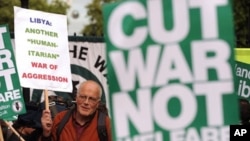A senior U.N. official warns conditions in Libya are continuing to deteriorate and life-saving assistance is urgently needed.
In launching the appeal, U.N. Humanitarian Coordinator for Libya, Panos Moumtzis, says his main concern is for the western part of Libya where 80 percent of the population lives. “Our concern for the west is that the situation in the west due to the sanctions, with the low availability of medical supplies, of food supplies, the fuel embargo, the cash flow shortages-it is really like a time bomb ticking where the longer the crisis lasts, the more grave the humanitarian situation is,” said Moumtzis.
The UN envoy acknowledges the difficulties people are facing in the besieged city of Misrata. But, he notes relief ships have been able to bring supplies to the port of Misrata from time to time and distribute food, water and other essential goods to the population.
But, he says the situation in the capital Tripoli and in the Western Nafusa Mountains is worse. He tells VOA when he was in Tripoli two weeks ago, he saw for himself the terrible impact of the conflict and sanctions upon the people.
“There were very long queues-two kilometers long at petrol stations, people, civilians queuing up with their cars. I stopped and asked and they told me that they wait for up to three days to basically refill their car because of the lack of fuel. Now the lack of fuel has a snowball effect on everything because goods are not being transported in the country, public transport is being significantly reduced or paralyzed. The children do not go to school. People find it very difficult to go to work. I saw a significant number of shops really closed while I was there,” he said. “Over 60 percent of health workers have left the country.”
Moumtzis is calling for a humanitarian pause that is a temporary halt in hostilities by all parties. This would allow aid workers to gain access to people in war-torn areas and provide them with assistance.
He says he is going to Tripoli to negotiate with all sides for guarantees of safety so relief workers can do their jobs without fear.















